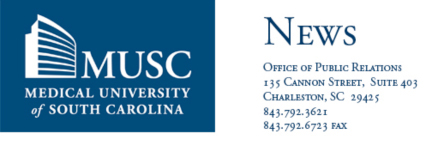
Contact: Heather Woolwine
843.792.7669
woolwinh@musc.edu
June 10, 2008
CHARLESTON -- In learning how to perform patient care
procedures, the old adage has always been "see one, do one" for health-care
students. With the opening of the MUSC Health Care Simulation Center at the
MUSC College of Nursing, the new student mantra might be, "see one, practice
one, do one. "
The MUSC Health Care Simulation Center is part of a statewide network of
simulation centers called Health Care Simulation South Carolina, and is under
the umbrella of Health Sciences South Carolina (HSSC). The Simulation Center is
also supported by the state's Centers of Economic Excellence Program (CoEE),
which enables the state's three research universities to create specialized
centers in areas that will advance South Carolina's economy and to recruit
world-renowned scientists (CoEE endowed chairs) to lead those centers. Directed
by international simulation expert John Schaefer, M.D., Endowed Chair in Patient
Simulation Education and Research, and championed by MUSC College of Nursing
Dean Gail Stuart, Ph.D., the center offers the future of interprofessional
health-care education and training to promote greater efficiency and patient
safety.
"This new center and collaborative network puts South Carolina at the
forefront of healthcare simulation internationally," Schaefer said. "The
use of health-care simulation for educational and patient safety training is
very similar to its use in other high-risk, high-cost industries like aviation
and the military. This resource will be broadly used by a range of physicians,
nurses, students and EMT's. We are very excited to bring this to South
Carolina."
The 11,000-square-foot center houses more than $900,000 in sophisticated
simulation technology including more than 50 advanced adult and infant
simulators. The simulators are used to provide clinical training to nursing,
medical and allied health students as well as continuing education for
practicing health care professionals. MUSC's center includes machines that
simulate giving birth, an emergency room with four different patients
(including trauma), cardiopulmonary resuscitation (CPR), an operating room environment, heart attacks and more.
The center marks the second opening of seven planned centers including
Charleston, Greenville (open), Beaufort, Clemson, Spartanburg and Columbia (one
of two open).
As South Carolina's aging population continues to increase, the demand for more
health-care services illuminates a critical need to have an adequate number of
skilled and compassionate health-care providers who can perform safely and
efficiently in a real-world setting. The new MUSC Health Care Simulation Center
allows students to practice their clinical skills in a controlled, risk-free
environment, rather than in an actual patient care setting.
"Simulation opens new opportunities for us in health care," Dean Stuart
said. "Not only can we educate nurses and other health-care providers more
effectively and more efficiently, but we also can explore the impact of
emerging technologies, improve interactions among health-care team members, and
prepare our students for a world in which technology is an essential element of
practice. This is all about better health care outcomes for patients, and our
simulation center brings the cutting edge of professional education to MUSC."
Specifically, as nurses become increasingly responsible for a larger share of
patient care and much of which is extremely technology-intensive, the MUSC
Health Care Simulation Center creates an environment where they can learn these
critical skills while optimizing patient safety. Beginning nurses and other
health-care professionals can now make their most common, most dangerous, and
most preventable mistakes on a simulated patient, where the worst possible
outcome is to try again. Today's technology enables the health care community
to learn in a safe, guided environment as simulated patients replace real ones
in the early parts of education.
In addition, Greenberg noted the center will continue to foster
interprofessional opportunities for student learning. "One of the most
exciting aspects of the simulation lab is that it provides an environment for
our students, residents and faculty to work across traditional
disciplinary boundaries. Here, doctors and nurses and pharmacists, and
therapists can be trained about how to function together effectively," he
said. "Health care is a team sport, and the simulation lab is the practice
field for honing our skills at collaboration."
###
About MUSC
Founded in 1824 in Charleston, The Medical University of South Carolina is the oldest medical school in the South. Today, MUSC continues the tradition of excellence in education, research, and patient care. MUSC educates and trains more than 3,000 students and residents, and has nearly 11,000 employees, including 1,500 faculty members. As the largest non-federal employer in Charleston, the university and its affiliates have collective annual budgets in excess of $1.6 billion. MUSC operates a 750-bed medical center, which includes a nationally recognized Children's Hospital and a leading Institute of Psychiatry. For more information on academic information or clinical services, visit www.musc.edu or www.muschealth.com.
#####